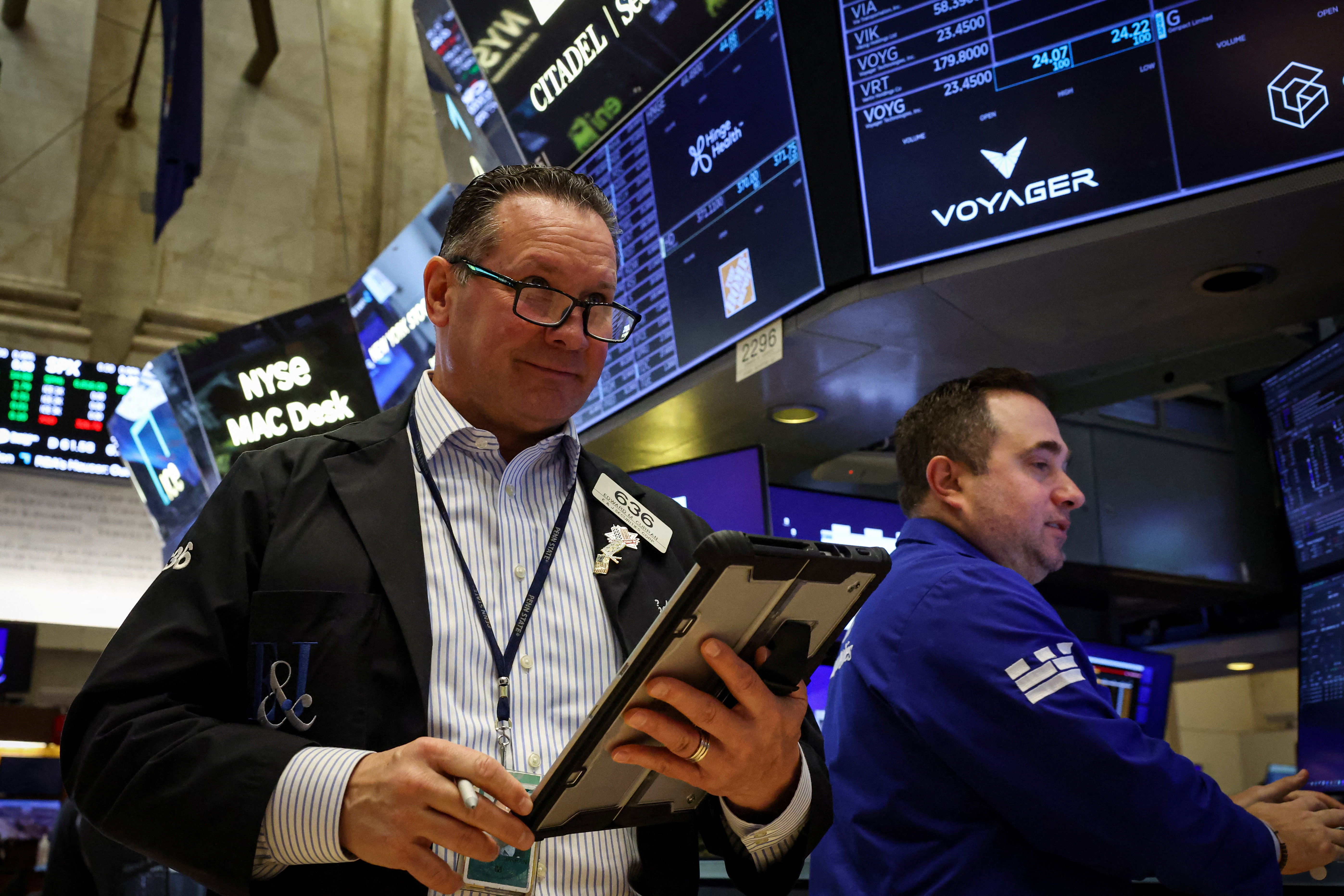What matters in U.S. and global markets today
By Mike Dolan, Editor-at-Large, Finance and Markets
Anticipation of AI giant Nvidia's results after today's closing bell allowed Wall Street stock futures to catch a breath after this week's latest tech-driven selloff. Meanwhile, global markets are also watching another withering slide in Japan's yen and government bond prices.
There was no respite for U.S. tech on Tuesday, with anxiety about AI-related valuations, over-spending and increasingly leverage in the sector dragging the S&P500 and Nasdaq into the red for the fourth straight trading day.
While rotation of stock sectors saw the small-cap Russell 2000 eke out a small gain, selling on the main indexes was not all about AI. Shares of Home Depot dropped 6% after the home improvement chain gave a forecast for full-year profit that disappointed and missed quarterly earnings estimates.
Apart from Nvidia earnings, the other big events of the week will be the long-awaited September payrolls and Walmart results on Thursday. Retailer Target is also due to report later today.
Even though the main U.S. index futures regained ground early on Wednesday, the VIX volatility gauge remained elevated above long-term averages and stuck at about 24. Crypto markets also remained on edge, with digital token Bitcoin limping back below $92,000 again after Tuesday's bounce.
U.S. macro markets were more subdued by comparison. With a 20-year bond auction due later today, Treasuries caught something of a bid from Tuesday's equity selling - but longer-term yields reversed most of that overnight.
Although futures markets now do not fully price another Federal Reserve rate cut until March, the release today of minutes from the Fed's last meeting may give marginally more clarity about what has been read about a more hawkish turn.
Shorter-dated Treasury yields stayed lower, however, as jobless claims data on Tuesday showed the number of Americans on jobless benefits surged between mid-September and mid-October, suggesting an elevated unemployment rate in October. That picture was reinforced by ADP's data showing private employers shed an average of 2,500 jobs a week during the four weeks ending November 1.
But new jobless claims during that period were unchanged, which cut across speculation that the government shutdown led to an increase in layoffs.
Overseas bond markets were more restive on Wednesday, with Japan's yen and Japanese government bond prices falling to new lows amid worries about loosening government fiscal policy and political pressure on the Bank of Japan to resist tightening monetary policy too much.
Yields on 10, 30 and 40-year JGB soared to new highs and the yen fell to its weakest against the dollar since January and a record low against the euro.
A sale of about 800 billion yen in 20-year JGBs by the Ministry of Finance had a bid-to-cover ratio of 3.28, down from the previous sale but around the average over the past year.
The market is nervous, however, about a ruling-party panel's proposal on a supplementary budget exceeding 25 trillion yen ($160.86 billion) to fund Prime Minister Sanae Takaichi's planned stimulus.
It also wary about pressure on the Bank of Japan to toe the line. BOJ Governor Kazuo Ueda met key government ministers on Wednesday, including Finance Minister Satsuki Katayama. Katayama said the meeting about maintaining "close coordination" between government and central bank and closely monitoring market with a "high sense of urgency".
Elsewhere, British inflation slowed last month for the first time since May, offering relief to the government before next week's annual budget, and boosting the chance of a December rate cut by the Bank of England.
Canada's dollar slipped back from its best level of the month, after staging its biggest one-day gain in three months on Tuesday. The move came after the Canadian Parliament this week narrowly voted in favor of Prime Minister Mark Carney's first budget, staving off the risk of a second election in less than a year.
In today's column, I take a look at how global investors are viewing the AI investment frenzy as an overspend and fretting about what comes next.
Today's Market Minute
Chart of the day
President Donald Trump's approval rating fell two percentage points to 38% this month, the lowest since his return to power, with Americans registering concerns about his handling of the high cost of living and the investigation into the late convicted sex offender Jeffrey Epstein, a Reuters/Ipsos opinion poll found.
Just 26% of Americans say Trump is doing a good job at managing the cost of living, down from 29% in the prior poll. Some 65% of respondents - including one in three Republicans - disapprove of Trump's performance on the cost of living.
Today's events to watch
* US August trade balance (8:30 EDT)
* Federal Open Market Committee issues minutes (1:00 EDT)
* Federal Reserve Board Governor Stephen Miran, New York Fed President John Williams, Dallas Fed President Lorie Logan and Richmond Fed boss Thomas Barkin all speak
* US corporate earnings: Nvidia, Palo Alto Networks, Target, Lowe's, TJX, Progressive, Williams-Sonoma
* US Treasury sells $16 billion of 20-year bonds
Want to receive the Morning Bid in your inbox every weekday morning? Sign up for the newsletter here. You can find ROI on the Reuters website, and you can follow us on LinkedIn and X.
Opinions expressed are those of the author. They do not reflect the views of Reuters News, which, under the Trust Principles, is committed to integrity, independence, and freedom from bias.

